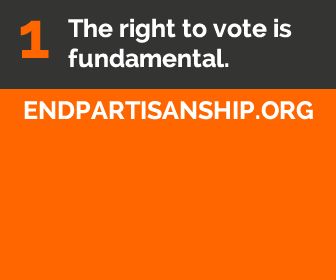As Cost of Oregon Primaries Rises, Voters Pay More for Elections They Can't Vote In

The Oregon secretary of state indicates that as of February 14, of the 2,153,889 registered voters in the state, approximately 38.9 percent were registered with the Democratic Party, while 30.5 percent were registered with the GOP. Meanwhile, the percentage of registered voters not affiliated with one of the major parties is 30.6 percent, marking the first time in the state's history this bloc of voters surpassed one of the major parties.
Yet Oregon, like most of the U.S., disenfranchises a very large portion of the electorate by continuing to provide the two mainstream parties with a distinct advantage through the allocation of public funds for their closed primary elections. These are elections nearly a third of the voting population can't participate in unless they register with a party, but they still contribute to their funding.
Since 1999, all Oregon statewide primaries have been conducted by mail-in ballots, the cost of which -- along with the cost of the GOP and Democratic primaries -- has increased steadily since the beginning of the 21st Century. Below is the cost of primaries and mail-in ballots for Oregon voters as listed by the Oregon secretary of state:
Total Primary Cost
Year
Amount
2000
$7.18 Million
2002
$7.52 Million
2004
$6.64 Million
2006
$6.47 Million
2008
$8.77 Million
2010
$8.60 Million
2012
$8.75 Million
Total
$53.93 Million
With the percentage of voters choosing not to affiliate with the GOP or the Democratic Party averaging 26 percent over the same 12 year period, approximately $14 million of that total was funded by those who are restricted from even participating in this vital stage of the election process -- where candidates are selected for the general election ballot.
For a number that has grown by 15 percent over the same period of time, this is a sizable sum of money to pay just for the privilege of being excluded in what is arguably the most important phase of our elections.Just how did two private organizations become so powerful in the U.S. that they are able to control the outcome of elections across America? How did so many voters lose their voice; especially in one of most progressive-minded states in the union?
The election process didn't begin this way; we didn't simply awake one Tuesday morning to find ourselves straddled with what we commonly hear as "a choice between bad and worse." Rather, after 200 years of gerrymandering and the manipulation of voting laws, our influence in the election process has steadily declined -- the results of which is an unresponsive, unrepresentative government.
Photo Source: Wikimedia Commons






